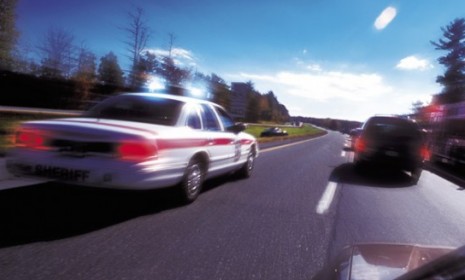The Supreme Court ruling on warrantless GPS tracking: 'Simply wrong'?
The nation's highest court unanimously deems it illegal to digitally track a person's vehicle without a warrant. Will that help criminals go undetected?

On Monday, the Supreme Court unanimously ruled that police must obtain a warrant before using a GPS device to track a vehicle — a major victory for privacy rights supporters. "The government's installation of a GPS device on a target's vehicle, and its use of that device to monitor the vehicle's movements, constitutes a 'search,'" said Justice Antonin Scalia, representing the five-justice majority. (The other four arrived at the same decision but wrote other, concurring opinions). The ruling has some Americans outraged, since the extra steps police must take to get a warrant might allow lawbreakers to go undetected for longer. What should we make of this ruling?
It doesn't go far enough: This decision is a "major victory" for people who demand a "clear translation of basic constitutional rights in the digital age," says Kade Crockford at Boston.com. But if anything, the ruling doesn't go far enough, largely because it doesn't extend to GPS tracking on a person's phone. The government has already shown its "keen interest in mobile phone tracking and obtaining information about us from third-party holders without warrants." Now that our phones are packed with all of our private information, these issues "could not be more important."
"Victory! Government must get a warrant to use GPS tracking devices on our cars"
The Week
Escape your echo chamber. Get the facts behind the news, plus analysis from multiple perspectives.

Sign up for The Week's Free Newsletters
From our morning news briefing to a weekly Good News Newsletter, get the best of The Week delivered directly to your inbox.
From our morning news briefing to a weekly Good News Newsletter, get the best of The Week delivered directly to your inbox.
This is outrageous: The Supreme Court's decision is "simply wrong," argues David Coursey at Forbes. Now that law enforcement officials will need "probable cause" to track a vehicle, criminals have the green light to "behave even more boldly, knowing their movements are now more difficult to track without detection." The way we're going, "how long will it be until any form of police surveillance requires a warrant? At this rate, not very long, I fear."
"Criminals laud Supreme Court GPS decision (or should)"
And we can't keep looking to the past for answers: "All nine of the justices, I suspect, would be relieved if Congress would take on the tough questions posed by the combination of computer power and ubiquitous tracking devices," says Garrett Epps at The Atlantic. Because in a technology-driven age, there will only be more "difficult questions" to answer. And we need to stop looking to the past for solutions. "Could colonial sheriffs have smuggled a tiny constable into a carriage?" Of course not. So why does the Supreme Court keep relying on the precedent of 18th-century legal wisdom to make these decisions?
"Justice Scalia turns to 18th-century wisdom for guidance on GPS"
A free daily email with the biggest news stories of the day – and the best features from TheWeek.com
-
 Nasa’s new dark matter map
Nasa’s new dark matter mapUnder the Radar High-resolution images may help scientists understand the ‘gravitational scaffolding into which everything else falls and is built into galaxies’
-
 Is the US about to lose its measles elimination status?
Is the US about to lose its measles elimination status?Today's Big Question Cases are skyrocketing
-
 ‘No one is exempt from responsibility, and especially not elite sport circuits’
‘No one is exempt from responsibility, and especially not elite sport circuits’Instant Opinion Opinion, comment and editorials of the day
-
 The billionaires’ wealth tax: a catastrophe for California?
The billionaires’ wealth tax: a catastrophe for California?Talking Point Peter Thiel and Larry Page preparing to change state residency
-
 Bari Weiss’ ‘60 Minutes’ scandal is about more than one report
Bari Weiss’ ‘60 Minutes’ scandal is about more than one reportIN THE SPOTLIGHT By blocking an approved segment on a controversial prison holding US deportees in El Salvador, the editor-in-chief of CBS News has become the main story
-
 Has Zohran Mamdani shown the Democrats how to win again?
Has Zohran Mamdani shown the Democrats how to win again?Today’s Big Question New York City mayoral election touted as victory for left-wing populists but moderate centrist wins elsewhere present more complex path for Democratic Party
-
 Millions turn out for anti-Trump ‘No Kings’ rallies
Millions turn out for anti-Trump ‘No Kings’ ralliesSpeed Read An estimated 7 million people participated, 2 million more than at the first ‘No Kings’ protest in June
-
 Ghislaine Maxwell: angling for a Trump pardon
Ghislaine Maxwell: angling for a Trump pardonTalking Point Convicted sex trafficker's testimony could shed new light on president's links to Jeffrey Epstein
-
 The last words and final moments of 40 presidents
The last words and final moments of 40 presidentsThe Explainer Some are eloquent quotes worthy of the holders of the highest office in the nation, and others... aren't
-
 The JFK files: the truth at last?
The JFK files: the truth at last?In The Spotlight More than 64,000 previously classified documents relating the 1963 assassination of John F. Kennedy have been released by the Trump administration
-
 'Seriously, not literally': how should the world take Donald Trump?
'Seriously, not literally': how should the world take Donald Trump?Today's big question White House rhetoric and reality look likely to become increasingly blurred